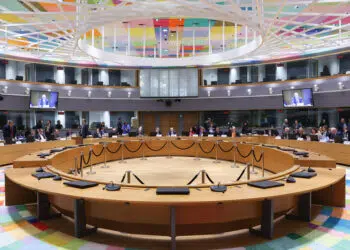Brussels – Strasbourg is clamoring for an EU industrial strategy on small nuclear reactors. It was by a large majority (409 votes in favor, 173 against, and 31 abstentions out of 613 votes cast) that the Strasbourg Chamber today (Dec. 12) adopted a initiative report on small modular nuclear reactors, authored by Slovenian MEP from the EPP, Franc Bogovič, calling for a specific comprehensive industrial strategy for the development of small nuclear reactors in the European Union. The own-initiative report is not a legislatively binding text, but it is a way for the Europarliament to shine a spotlight on the issue and let the Commission know that the dossier matters. And it has done very loudly.
Small modular reactors are nuclear reactors that are smaller in both power and physical size than conventional gigawatt-scale power plants, with a power range of 10 to 300 MegaWatts. They are based on existing technologies and are designed to be factory-built in standard modular form, and their main advantage is that they can be assembled in the factory and then shipped and installed on-site, so even in remote areas with limited grid capacity or in areas where the use of large conventional nuclear power plants is not possible.
These types of reactors use nuclear fission reactions to create heat that can be used directly or to generate electricity and have recently returned to the center of political debate in the EU in the midst of the energy crisis with Russia and in an effort to diversify sources of supply. The report also emphasizes the potential of nuclear power and small nuclear reactors in contributing to the EU’s clean energy goals and calls for the development of “a comprehensive strategy for the deployment of small reactors in the EU, taking into account the specific needs and circumstances of different regions and sectors.” It also recognizes their potential to play a “significant” role in fossil fuel substitution, low-carbon hydrogen production, industrial heat production, and district heating.
Compounded by a waning legislative term, the European Commission does not have a full-fledged legislative initiative on mini-reactors in the pipeline. But it has announced in recent months its intention to transform the European Partnership for Small Nuclear Reactors into a full-fledged EU Industrial Alliance, based on three pillars specifically: the safety from radiation, the contribution of small reactors in the EU’s pathway to climate neutrality by 2050, and a coordinated approach among member states on initiatives to enable “collective success.”

“Nuclear energy technologies remain an important part of the EU’s decarbonization pathway. Our top priority remains that new projects have the highest nuclear safety standards,” confirms EU Energy Commissioner Kadri Simson. Currently, 12 out of 27 EU member states (Belgium, Bulgaria, Finland, France, Hungary, the Netherlands, the Czech Republic, Romania, Slovakia, Slovenia, Spain and Sweden) host nuclear power plants on their territory. Other countries, such as Poland, are proposing to develop nuclear power for the first time. In 2021, nuclear power made up 13.1 percent of the EU’s energy mix and accounted for 25 percent of all electricity generated.
English version by the Translation Service of Withub





